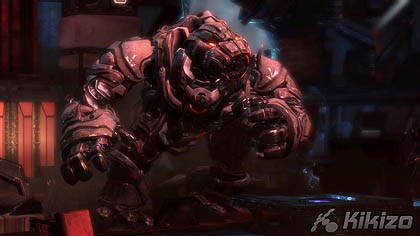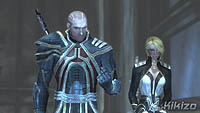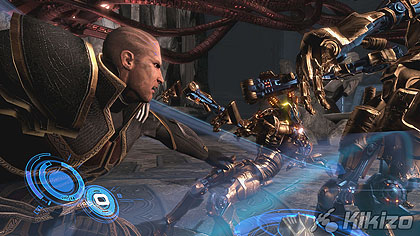Interview: Silicon Knights' Denis Dyack
We talk Silicon Knights' founder and president to get his latest views on the games industry, as well as the lowdown on Too Human, which is finally released later this month.
Page 3
Kikizo: So let's talk a bit more about Too Human, the last time I saw it was with you at E3 2006, and I think it's looking a lot more fluid now.
Dyack: Yes, it's finally done, we've rewritten the engine, it's totally new. We can get a ton of enemies on screen, very, very fast, the responsiveness, the frame rate is very high. And you can see for multiplayer, there's no difference - it's [visually] exactly the same experience. The amount of polishing when you do a game like this, the RPG segments are so deep I can't even explain without you actually sitting down and playing it. The number of combinations and permutations you can get - imagine hundreds of thousands of cybernetic implants, weapons, different combos, skill tree combinations - to balance all of that stuff - is this class too powerful compared to the defender, is the defender more powerful than the champion - that has taken a really long time, and we had to make sure that the technology is seamless so that the consumer will feel that they got really good value from the game.
When you play the game you can just continue to level up - in the first Too Human you can go up to level fifty and there's all kinds of epic loot, rare items, rare drops, and we've got a system in where if you play an entire level from beginning to end, your chance of getting an epic drop is very high. You can see here some co-operative play now, and there are some Achievements based on that as well. Co-op offers replay value but it's not the only way to play; some people will jump straight into co-op, but I'm particularly drawn to content in video games, so I want see all the content and story. Too Human has almost a feature film just in cinema and story.
Kikizo: I remember seeing Too Human shown in video form at Spaceworld 2000, the GameCube's unveiling. But apparently the game's roots predate even this?
Dyack: A lot of people think we started development in 1992 and that's completely incorrect - really development started on the 360 only when we started on this particular version. When we became a second party of Nintendo we weren't working on Too Human during that time, we were working on Eternal Darkness and Metal Gear Solid. Then we started working on the Unreal engine and reworking it took a long time, but now that we're past all that it's really come together.
Kikizo: How much work on the second and third games are done, is the story complete?
Dyack: The story was done a long time ago. The theme of the first game is discovery, the theme of the second game is revenge, and the third game, enlightenment. And the trilogy and the whole idea of focusing on the Norse mythology and effects on technology we think is really going to turn people's heads. There are so many things you can focus on with Too Human; you can focus on the multiplayer, the visceral combat, the deep RPG system. We're tending really not to focus on talking about our story, because we're known for story! But in my opinion the story in Too Human is the best story we've ever created. It's really, really solid, we've had a long time to think about it. That's one of the things that has been in our heads for, you know, a decade. I'm really personally interested to see how it's going to do in Europe, because in North America, Norse mythology is not that well known, but in Europe people know Norse mythology, and I love it when people from Europe ask us why we have used certain characters, that gets us really excited because when people find out what we're really doing, I think they're going to like it.
Kikizo: What was it about Norse mythology that inspired you originally? Why did you base the game on it?
Dyack: Well our director of content, Ken McCulloch, is originally from the UK, and he's been with us now sixteen years, but he came to Canada when he was like ten years old. Silicon Knights always, with almost every game, does a lot of research into mythologies, and way back in 1992, I was reading Greek mythology and he was like, "man, Greek mythology is so boring, what about Norse mythology", and I was like, I don't know anything about Norse mythology! So he threw a book at me, and we started talking about it, and it was so perfect because in Norse mythology, none of the gods are immortal - they die. They know that the end of the world is coming, and rather than try to get out of that they face it with grim determination, which is perfect for our comments on technology and the effects of technology on society, because we can't avoid technology increases and where it's going, so all those metaphors fit so perfectly. And then the whole idea of cyclic history - the ice ages - it's perfect. So that was sixteen years ago and now I know a lot about Norse mythology!













 Satoru Iwata Video Interview - the late Nintendo president spoke with Kikizo in 2004 as 'Nintendo Revolution' loomed.
Satoru Iwata Video Interview - the late Nintendo president spoke with Kikizo in 2004 as 'Nintendo Revolution' loomed. Kaz Hirai Video Interview - the first of Kikizo's interviews with the man who went on to become global head of Sony.
Kaz Hirai Video Interview - the first of Kikizo's interviews with the man who went on to become global head of Sony. Ed Fries Video Interview - one of Xbox's founders discusses an epic journey from Excel to Xbox.
Ed Fries Video Interview - one of Xbox's founders discusses an epic journey from Excel to Xbox. Yu Suzuki, the Kikizo Interview - we spend time with one of gaming's most revered creators.
Yu Suzuki, the Kikizo Interview - we spend time with one of gaming's most revered creators. Tetris - The Making of an Icon: Alexey Pajitnov and Henk Rogers reveal the fascinating story behind Tetris
Tetris - The Making of an Icon: Alexey Pajitnov and Henk Rogers reveal the fascinating story behind Tetris Rare founders, Chris and Tim Stamper - their only interview? Genuinely 'rare' sit down with founders of the legendary studio.
Rare founders, Chris and Tim Stamper - their only interview? Genuinely 'rare' sit down with founders of the legendary studio. The History of First-Person Shooters - a retrospective, from Maze War to Modern Warfare
The History of First-Person Shooters - a retrospective, from Maze War to Modern Warfare